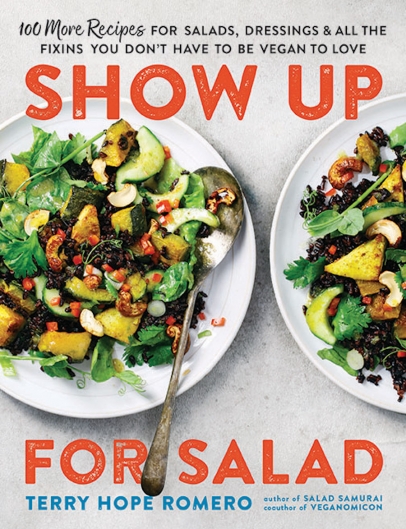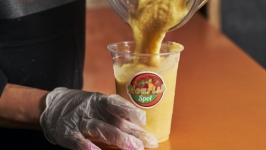Show Up for Salad
To Terry Hope Romero, “salad” doesn’t have to be a scary word that signifies deprivation and tedium. That’s also how the cookbook author, whose book Veganomicon (co-written with Isa Chandra Moskowitz) has become the Joy of Cooking for the plant-based, feels about the word “vegan.”
In her books Salad Samurai! and the brand-new Show Up for Salad, Romero manages to transform preconceived notions around both: By focusing on texture, variety, rich flavors and protein, she shows that eating one’s vegetables need not be dull, and that being vegan doesn’t mean a life limited to lettuce and tofu: It can mean a life of very well-dressed lettuce and flavorful marinated, grilled tofu.
“A good salad is one that is not wimpy. It doesn’t leave you hungry,” Romero tells me. “It definitely hits a few different tastes, textures and even temperatures all at the same time. You have your base of crunchy light greens—the stuff that’s refreshing—then I like a hearty vegetable in there to contrast.”
On top of those, Romero advocates for juicy components, like tomatoes, berries or mango, and protein, the latter of which she’s been trying to push, as it’s the key to make a salad filling and nutritious enough to carry one through to dinner without hunger pangs hitting within a couple of hours.
In the book, Romero provides ample instruction on prepping tofu, seitan, tempeh and legumes. Each of the major plant proteins gets a full explanation of how one should marinate and prepare it, making Show Up for Salad a fine introduction for a beginner chef. There are seitan cutlets, a whole-loaf blackened tempeh pastrami, roasted lemon pepper chickpeas and more, all written in the approachable style fans of Veganomicon and Romero’s own Viva Vegan may be familiar with. However, even someone who’s never heard of tempeh will find that pastrami idea doable and comprehensible. The finished product goes into a “Reuben salad,” which combines all the delicious ingredients of the famous sandwich, from sauerkraut to Russian dressing, in a way that allows one to feel satisfied while getting a hearty helping of greens instead of bread and cheese.
Sans cheese doesn’t mean it’s all vinaigrette, all the time, though. The incredible number of creamy dressings in the book might be a surprise to anyone unfamiliar with vegan cuisine, but there are also new ideas for the folks who make a classic tahini Caesar dressing on a weekly basis. There are numerous variations on ranch, tahini mayo and miso sauce, a cucumber dill that makes a great tzatziki and many more.
Where Salad Samurai! focused heavily on blended soaked cashews for these types of dressings, here Romero has gotten into hemp and sunflower seeds, recognizing that the vegan focus on cashews, which are a tropical plant, might not be ecologically sustainable.
“By default, being vegan, you do think outside of the grocery store. ‘Where does this food come from?’ ‘What’s going on in the world that could possibly impact what we should eat and how we should make certain decisions?’” she says. “I do get concerned there’s an overreliance on certain ingredients, like coconut or something controversial like palm oil and cashews, which I made liberal use of in my first book.” In varying the fats she used in this book, she was taking notes from people with nut allergies as well as cues from conversations around climate change.
For Romero, who’s lived in Queens for two decades, the borough is a source of constant inspiration. “One of my books, Vegan Eats World, is secretly my vegan fantasy about Queens,” she says. “I live in Forest Hills and I shop a lot in Jackson Heights, Flushing, Elmhurst and all the places in between. I am so inspired by the incredible diversity in Queens, and how easy it is to buy Himalayan spices and Colombian spices, and snack on Indian chaat, all within an afternoon.” Those influences always make their way into her books and appear here in the Thai Basil Spaghetti Squash with Curry Tofu and the Lazy Seitan Gyro Spinach Salad.
By writing salad books, Romero knows she’s playing into stereotypes of veganism—but in practice, these books explode stereotypes and explore what she believes are broader eating trends. If people are willing to stand on line at fast-casual spots like Sweetgreen, why not create more extensively conceptualized salads at home?
“Everyone’s getting on board. Easy, convenient meals should be salad. But no one wants a boring salad, whether they’re vegan or not,” she says. That’s where her books come in. “Now is the time for salad! Salad for everybody. That’s my platform.”






